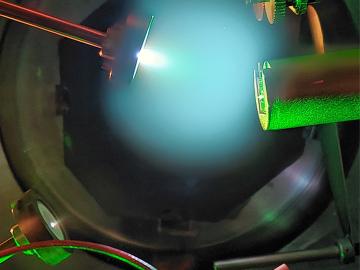
Filter News
Area of Research
- Advanced Manufacturing (3)
- Biology and Environment (12)
- Computational Biology (1)
- Computational Engineering (1)
- Computer Science (6)
- Electricity and Smart Grid (1)
- Energy Science (28)
- Functional Materials for Energy (1)
- Fusion and Fission (1)
- Fusion Energy (1)
- Isotopes (1)
- Materials (31)
- Materials for Computing (6)
- National Security (2)
- Neutron Science (5)
- Nuclear Science and Technology (1)
- Supercomputing (21)
News Type
News Topics
- (-) Artificial Intelligence (33)
- (-) Big Data (26)
- (-) Biomedical (18)
- (-) Composites (16)
- (-) Exascale Computing (11)
- (-) Frontier (10)
- (-) Machine Learning (19)
- (-) Nanotechnology (25)
- (-) Polymers (15)
- 3-D Printing/Advanced Manufacturing (57)
- Advanced Reactors (18)
- Bioenergy (26)
- Biology (31)
- Biotechnology (6)
- Buildings (31)
- Chemical Sciences (31)
- Clean Water (14)
- Computer Science (70)
- Coronavirus (15)
- Critical Materials (13)
- Cybersecurity (9)
- Emergency (2)
- Energy Storage (50)
- Environment (67)
- Fossil Energy (1)
- Fusion (19)
- Grid (28)
- High-Performance Computing (33)
- Hydropower (6)
- Irradiation (3)
- Isotopes (15)
- ITER (5)
- Materials (70)
- Materials Science (54)
- Mathematics (3)
- Mercury (3)
- Microscopy (21)
- Molten Salt (6)
- National Security (13)
- Neutron Science (42)
- Nuclear Energy (36)
- Partnerships (11)
- Physics (11)
- Quantum Computing (9)
- Quantum Science (18)
- Security (4)
- Simulation (16)
- Software (1)
- Space Exploration (11)
- Statistics (1)
- Summit (11)
- Transportation (52)
Media Contacts

ORNL has been recognized in the 21st edition of the HPCwire Readers’ and Editors’ Choice Awards, presented at the 2024 International Conference for High Performance Computing, Networking, Storage and Analysis in Atlanta, Georgia.

Researchers used the world’s fastest supercomputer, Frontier, to train an AI model that designs proteins, with applications in fields like vaccines, cancer treatments, and environmental bioremediation. The study earned a finalist nomination for the Gordon Bell Prize, recognizing innovation in high-performance computing for science.

Researchers at Oak Ridge National Laboratory used the Frontier supercomputer to train the world’s largest AI model for weather prediction, paving the way for hyperlocal, ultra-accurate forecasts. This achievement earned them a finalist nomination for the prestigious Gordon Bell Prize for Climate Modeling.

A research team led by the University of Maryland has been nominated for the Association for Computing Machinery’s Gordon Bell Prize. The team is being recognized for developing a scalable, distributed training framework called AxoNN, which leverages GPUs to rapidly train large language models.

A team of researchers used the Frontier supercomputer and a new methodology for conducting a genome-wide association study to earn a finalist nomination for the Association for Computing Machinery’s 2024 Gordon Bell Prize for outstanding

A multi-institutional team of researchers led by the King Abdullah University of Science and Technology, or KAUST, Saudi Arabia, has been nominated for the Association for Computing Machinery’s 2024 Gordon Bell Prize for Climate Modelling.

Oak Ridge National Laboratory researchers are using a new bioderived material to 3D print custom roosting structures for endangered bats.

Researchers led by the University of Melbourne, Australia, have been nominated for the Association for Computing Machinery’s 2024 Gordon Bell Prize in supercomputing for conducting a quantum molecular dynamics simulation 1,000 times greater in size and speed than any previous simulation of its kind.

ORNL researchers were honored with a prestigious ACE Award for Composites Excellence by the American Composites Manufacturers Association. The team won the “innovation in green composites design” prize for creating a fully recyclable, lightweight wind turbine blade tip that incorporates low-cost carbon fiber and conductive coating for enhanced protection against lightning strikes.

In a game-changing study, ORNL scientists developed a deep learning model — a type of artificial intelligence that mimics human brain function — to analyze high-speed videos of plasma plumes during a process called pulsed laser deposition.


